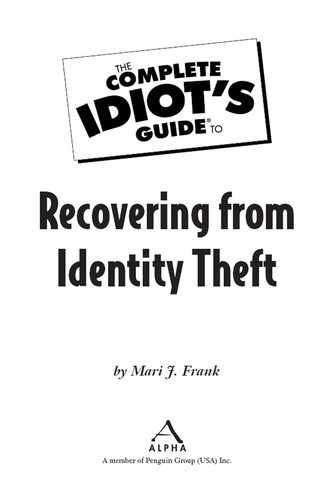If They Catch the Thief
Most identity thieves remain unknown, free to wreak damage to you or someone else. But sometimes your own investigative work in conjunction with the compassionate efforts of law enforcement will catch your evil twin.
If your impersonator is apprehended, although you may be worried about the perpetrator’s vengeance, there are some good reasons to cooperate in the prosecution:
♦ You’ve been violated and you are helping to make the criminal accountable for his or her crimes. This process will be an incentive for him or her to stop repeating the crime against you and others.
♦ Your assistance to the court and the criminal justice system empowers you to no longer feel like a victim but rather a defender of truth, which might facilitate emotional closure.
♦ You have the right to ask the court to order restitution for your out-of-pocket costs and lost wages.
♦ If there are companies or agencies that don’t believe you are a victim of fraud, the fact that you assisted in prosecuting the perpetrator will offer additional evidence of your innocence.
If you have reached the point where the prosecutor has even decided to file a complaint against your impostor, you should be proud, because that means you have cooperated with law enforcement and provided the DA or federal prosecutor with enough evidence for them to move forward. Without your facts and substantiation, there would be no case.
If the prosecutor decides to press charges, you need to know what to expect so that you can be calm and prepared. Here are some things you need to know about:
♦ Victim-impact statements
♦ Victim’s rights
♦ Victim assistance
♦ Restitution
These are all components of the last stages of being a crime victim: relief.
Victim-Impact Statement
Depending on how strong the evidence is or how much time from the court’s violent crime schedule is left for economic crime, the prosecutor might offer the criminal a plea bargain. In such circumstances, you will not need to testify in court, but you will need to talk to the probation department since they are usually involved in the plea bargain. You will have the right to ask for restitution and give the judge a victim-impact statement.
A well-written, concise victim-impact statement is critical to the judge at sentencing time because it helps the court to understand the severity of the crime and how your life has been affected. Economic crime is often perceived to be only about money, but if you have handled your case as recommended, you should not be paying the bills that your impostor created. Your real damages may be time, effort, reputation, and emotional.

Legal Lingo
A plea bargain results in a somewhat reduced charge or sentence recommendation in exchange for a guilty plea. A victim-impact statement is usually a written communication (sometimes also oral if the victim is available or the judge allows a video statement) from the identity-theft victim to the judge, detailing the emotional, physical, financial, and other impacts, stresses, and problems resulting from the actions of the identity thief.
The statement is sent to the judge before sentencing or before agreement to a plea bargain. Many states specifically require the court ruling on the offender’s status to consider the victim’s statements in making its decision. It gives the judge good reason to consider what you have suffered in the sentencing. Many judges, used to hearing cases of violent crimes such as murder, rape, and armed robbery, may not understand the consequences of a stolen identity. So it’s your job to enlighten the court so that justice may be accomplished.
Your impact statement should address the heart of what you and your family experienced as a result of being victimized by this crime. Be brief and succinct. Explain how you spent hours calling and writing letters, dealt with unsympathetic companies, lost your job, fought with your spouse, lost sleep, lost your appetite or gained weight, experienced post-traumatic stress disorder, got an ulcer—whatever you experienced. Speak from your heart but be very specific. You have a right to describe your losses and what you think should happen to the perpetrator. Here are some things you might consider requesting of the judge (although he or she is not obligated to fulfill your requests):
♦ Restitution for your losses with an accounting of such out-of-pocket losses as lost wages, travel costs, postage, long-distance charges, and attorney fees, with detailed written explanations and documentation.
♦ Long-term probation for the impersonator, if you know the person or you believe that this person is remorseful and could be rehabilitated.
♦ Mandatory counseling for the impostor and perhaps drug rehabilitation if the impostor is involved in using drugs.
♦ An appropriate jail or prison sentence for the criminal, especially if this person is a repeat offender or has multiple victims.
Along with victim-impact statements at sentencing, most states also allow input at the parole hearing of the offender. As a victim, you will be required to maintain a current address on file with the parole board, the prosecutor’s office, or criminal-justice agency. The original victim-impact statement that was prepared for the sentencing hearing is often included in an offender’s file by corrections and paroling authorities, and reviewed as part of the parole process.
The right to present victim-impact information, whether written or oral, is usually guaranteed by law. It will be important for you to speak with the prosecutor or his office to discuss how and when you must present your statement. Ask the prosecutor to refer you to the victim-assistance program so you can get help in preparing your impact statement and your testimony, if needed.

Information = Power
Whenever you send a victim-impact statement to the judge, send it out one to two weeks before either the beginning of the trial or the sentencing hearing. That will give the judge time to receive and review it. It’s crucial that you send it in a timely manner or you will lose your right to restitution.
Your Rights as a Victim
If your impostor has not been able to secure a plea bargain, then he or she will go to trial. If the proceeding is out of state or a long way from your home and there is plenty of evidence against him, you may not need to attend trial. You would still have the right to send an impact statement. For many victims, the prospect of testifying in court may be unsettling or even scary.
It’s important to know that the prosecutor represents the state, not you. For that reason it’s important to ask for help from the victim-assistance office, which is usually within the prosecutor’s office. Ask the victim-assistance program or the prosecutor for a written explanation of your rights within the jurisdiction of the court. Here are some of the rights you are entitled to expect:
♦ To be reasonably protected from the person who is accused of stealing your identity.
♦ To request that sensitive information—including Social Security number, bank accounts, credit report details, and driver’s license number—be redacted from any documents that will be filed with the court.
♦ To receive notification of all court hearings.
♦ Unless the court determines that your testimony would be affected by what you heard, to attend the trial and hear evidence.
♦ To speak to the prosecutor and the investigators and provide them evidence.
♦ To get copies of all information about the trial, including the complaint, the hearings, the transcripts (you will need to pay for this), the sentencing, and plea bargains.
♦ To be heard by the judge either orally or in writing in a victim-impact statement, including what you think should happen to the perpetrator
♦ To have the court consider ordering restitution be paid to you in a timely manner
♦ To be free from unreasonable delays in the prosecution of the case
♦ Tofairness, respect, and privacy

Identity Crisis
Although you have a right to be in court, you must be respectful of the judge and attorneys, even if you don’t agree with what is said—or the sentence.
Victim Assistance and Probation
When working with the prosecutor assigned to your case, the process may seem confusing and even frightening. Most district attorney or federal prosecuting attorney offices have victim-assistance programs that provide counseling to victims and help prepare them for the various stages of the trial. To find out more about victim assistance, visit the National Office of Victims of Crime online at www.ojp.usdoj.gov/ovc.
The probation department will investigate the defendant to make a recommendation to the court regarding the possibility of a probation sentence by the court. The probation department will interview the defendant, the victim, and others who may know the defendant and make a recommendation for or against probation. Once probation is ordered, either instead of or after incarceration, a probation officer will hold the person convicted of a crime accountable to ensure that he or she is meeting the requirements of the probation. A person “on probation” has been convicted of a crime but has served only part of the sentence in jail, or has not served time at all.
Restitution
In your victim-impact statement, you can ask the court to order the thief to make restitution to you for such things as the following:
♦ Medical expenses
♦ Therapy costs
♦ Lost wages
♦ Expenses such as travel costs and child care to participate in the trial process
♦ Lost or damaged property
♦ Prescription charges

Information = Power
Restitution will not cover such things as pain and suffering or emotional distress, but may cover reasonably expected future losses, such as ongoing medical or counseling expenses.
In calculating the restitution owed, a court will look at the victim’s losses and the convicted person’s financial resources. Be aware that your impostor may also be ordered to pay restitution to the credit-card companies and others from whom he has stolen.
This is one reason it’s critical to keep logs of all your expenses, as Chapter 2 explains. Realistically, if your impostor stole your identity for financial gain, it is unlikely that he or she will have the means to pay restitution. If the impostor goes to jail, it is likely that you won’t get restitution while he or she is incarcerated unless they are earning wages in prison.
Many jurisdictions provide that restitution orders become civil judgments, which means that, as a victim, you may eventually be able to collect, because the orders can remain in effect for a long time, typically 10 to 20 years. Depending on the jurisdiction, and whether the fraudster has the funds, your civil judgment may be enforceable immediately or after the criminal-justice process—probation, prison, or parole—is complete. When payment of restitution is a condition of probation or parole, probation or parole may be revoked if the defendant willfully fails to pay.
The reality is you can’t count on receiving restitution, even if the court orders it, and you may need to emotionally let go, because chasing the money may not be worth your time, effort, or stress. What’s most important is your physical, financial, and emotional health. So once you have resolved all the outstanding issues of your identity-theft adventure, you are ready to set up barriers to protect yourself as best you can from future fraudsters.
..................Content has been hidden....................
You can't read the all page of ebook, please click here login for view all page.
